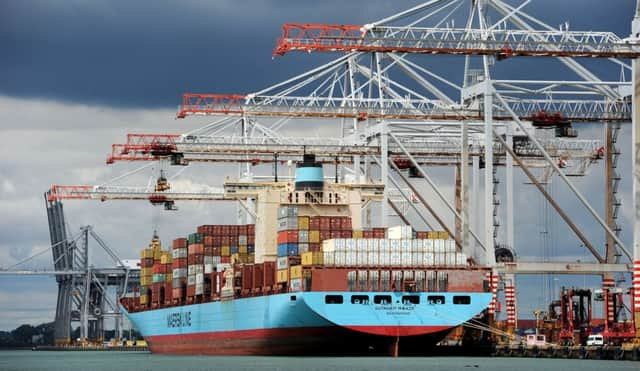UK's trade deficit reaches an eight-year high


The Office for National Statistics (ONS) said the UK’s trade deficit with the rest of the world in the first quarter widened to £13.3 billion from £12.2bn in the last three months of 2015, its biggest for any calendar quarter since the first quarter of 2008.
Data for March alone showed some improvement with the deficit in the trade in goods narrowing a bit to £11.2bn, slightly under economists’ expectations of £11.3bn.
Advertisement
Hide AdAdvertisement
Hide AdThe data follows last month’s ONS data which showed that gross domestic product (GDP) grew by 0.4% in the first three months of 2016, down from 0.6% in the fourth quarter of last year, following an industrial slump.
While last week a closely-watched survey by Markit/CIPS said that manufacturing sector activity had contracted for the first time in more than three years, with markets dogged by a slowdown in global trade led by easing growth in China.
The ONS said the UK trade gap widened over the quarter due to a £1.9 billion rise in imports in such as mechanical machinery, cars, clothing and footwear.
Over the same period exports rose by only £500 million, with chemicals products the top performer.
Advertisement
Hide AdAdvertisement
Hide AdLast month the Bank of England also warned that a Brexit vote on June 23 could hurt the economy and ‘’push down on demand’’ as it kept the cost of borrowing on hold once more.
The Bank’s Monetary Policy Committee (MPC) said the economy may face ‘’an extended period of uncertainty’’, as it considered the ‘’likely implication for monetary policy’’ if Britain left the European Union.
All nine policymakers on the MPC voted to leave rates at 0.5% - where they have remained since March 2009, and many economists forecast they will stay until 2017.
A spokesman for the Department for Business, Innovation and Skills said: “This Government wants to make Britain the best place in Europe to do business with and increasing exports remains a key priority.
Advertisement
Hide AdAdvertisement
Hide Ad“We have taken a number of steps to boost exports as we work towards having 100,000 more UK companies exporting by 2020.”
The spokesman added these measures included launching an export task force and transforming UK Trade and Investment agency “to ensure the whole of Government is focused on improving the UK’s export performance”.